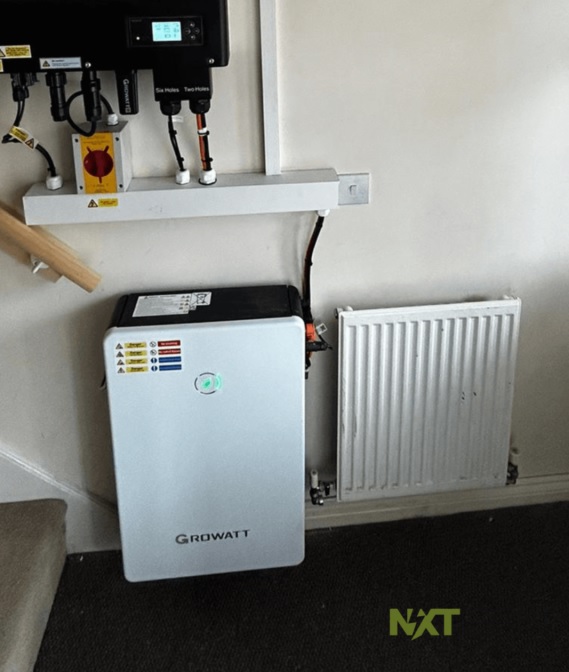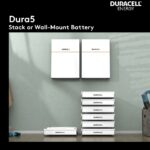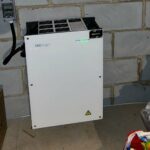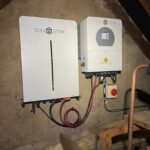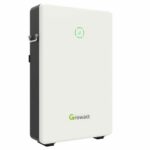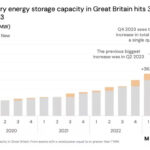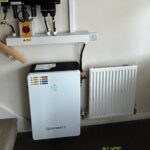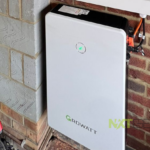Many people want to reduce their dependence on the National Grid and lower their energy bills, but they may face some obstacles, such as the high cost or an unsuitable roof for installing solar panels. However, there is another option that can help them achieve their goals: home battery storage systems.
Battery storage systems are devices that store excess electricity from the National Grid or from renewable sources, such as solar panels or wind turbines, so that you can use it when needed. They can provide several benefits for homeowners, such as:
- Saving money on electricity bills by using cheaper or free electricity during peak hours or power outages.
- Reducing carbon emissions and environmental impact by using more renewable energy and less fossil fuels.
- Increasing energy security and resilience by having a backup power source in case of National Grid failures or natural disasters.
- Unlike solar panels, battery storage systems do not require a specific roof orientation or size, and they can be installed indoors or outdoors. They can also work independently or in conjunction with solar panels and wind turbines, depending on the homeowner’s preferences and needs.
Therefore, battery storage systems are a viable and attractive solution for homeowners who want to become more energy independent and save on their energy bill, even if they do not have a solar PV system.
What is a Battery Energy Storage System (BESS)?
One of the ways to use electricity more efficiently and sustainably is to store it in battery storage systems, also known as battery energy storage systems (BESS). These systems can store electricity from different sources, such as the National Grid or renewable energy sources like wind turbines or solar panels. By storing electricity, homeowners and businesses can use it later when they need it most, such as during peak hours or power outages.
Battery storage systems come in various sizes and capacities, depending on the needs and preferences of the users. For example, some commercial properties may use large containerised units that can store up to several megawatts (MW) of electricity, while some domestic properties may use smaller stand-alone batteries that can store up to 5 kilowatts (5kW) of electricity.
Battery storage systems can work with or without renewable energy sources. For instance, some homeowners may have solar panels or wind turbines that generate electricity during the day or when the weather is favourable. They can use battery storage systems to store the excess electricity and use it at night or when the weather is unfavourable. This way, they can reduce their reliance on the National Grid and lower their carbon footprint. However, some homeowners may not have renewable energy sources, but they can still use battery storage systems to store electricity from the National Grid when it is cheap or abundant and use it when it is expensive or scarce. This way, they can save money on their electricity bills and increase their energy security.
Therefore, battery storage systems are a flexible and versatile solution that can help users to use electricity more efficiently and sustainably, regardless of whether they have renewable energy sources or not.
3 Reasons why home battery storage without solar panels is a good idea
1. Home battery storage can reduce your energy bill
One of the smart ways to lower your energy bills as a UK homeowner is to use home battery storage to take advantage of cheaper electricity rates during off-peak hours. Some electricity tariffs, such as Economy 7 and Octopus Go, offer lower prices for a certain number of hours each day, usually at night or early morning, when the demand for electricity is low. You can easily set up your home battery storage system to charge from the National Grid during these hours using a smartphone app.
By doing this, you can save money on your electricity bills and also help the National Grid to balance its supply and demand. This means less stress on the National Grid and less risk of power cuts for everyone!
How much can you save by charging your batteries from off-peak rates
So let’s take a look at the figures shall we? If you were to install a 6.5kWh Growatt battery, to charge to full on the current Octopus go off-peak rate (January 2023) of 9.5p per kWh it would cost you 61.75p. However, if you were to consume 6.5kWh during peak hours, it would cost you nearly 4 times as much. This means you can save £1.60 a day, or £584 a year by installing home battery storage of a single 6.5kWh battery.
2. Provides your home with a backup power supply
For homes that are located in rural or remote areas and often experience power-cuts, a generator may seem like a good option for backup emergency power. However, a better and greener alternative is to install a battery-only system, especially if you use a 100% green energy tariff. A battery-only system can store electricity from the National Grid or from renewable sources and use it when the National Grid fails. By adding an Emergency Power Supply (EPS) to your battery storage, you can ensure that some essential appliances in your home, such as your fridge, cooker or PC, will stay on during a blackout.
With the UK facing the risk of blackouts this year, due to possible gas and electricity shortages, now is the best time to install a home battery storage system with EPS. This way, you can protect your home from power disruptions and also save money on your energy bills and help the environment and the planet.
3. Battery storage increases your energy independence
If you want to be more eco-friendly and self-reliant in your energy consumption, but your home is not suitable for solar panels or a wind turbine, you can still install a stand-alone battery system. A stand-alone battery system can store electricity from the National Grid or from renewable sources and use it when you need it. This way, you can have more control over your energy usage and reduce your dependence on the National Grid for your power needs.
3 Reasons why installing solar panels with a battery is a better idea
1. You’re no longer reliant on the National Grid
A stand-alone battery system can store electricity from the National Grid, but it does not make you independent from it. You are still dependant on the National Grid for your electricity supply, and you have to pay the wholesale energy prices, which may vary depending on the demand and supply. You also have to accept the type of electricity that the National Grid provides, which may not be very green or clean. However, if you combine solar panels with a battery system, you can generate your own electricity from the sun, which is free and abundant energy. By doing this, you can cut your ties with the National Grid and save money and the environment. Instead of paying high energy bills to the National Grid owners, you can reduce your carbon emissions and help everyone to benefit from a cleaner and greener future.
2. Solar panels with battery storage is more cost-effective
If you want to save more on your energy bill, the best option is to install battery storage with solar panels. This way, you can use the electricity that you generate from the sun and store the excess in your battery for later use. According to EPVS, a trusted organisation that validates energy savings, you can reduce your annual electricity consumption by up to 90% with this combination. On the other hand, if you install a battery-only system, you will only save up to 15% on your electricity consumption. This is because you still have to rely on the National Grid for your electricity supply and pay the variable prices. Therefore, a solar PV system with battery storage is the ideal solution for saving more money and being more energy independent.
3. Installing solar panels reduces your carbon footprint
Solar panels enable you to produce your own renewable energy from the sun. This is a low-carbon technology that can help the UK reduce its greenhouse gas emissions. For example, a typical home with a solar panel system can prevent about one tonne of carbon from entering the atmosphere every year. Moreover, by installing a renewable energy system, you can also support the UK’s energy demand, by using less electricity from the National Grid and more from the abundant sunshine. This way, you can save money on your energy bills and contribute to a cleaner and greener future.
Installing solar panels can help you generate your own renewable energy and also earn you money by selling your excess electricity back to the National Grid. Through the Smart Export Guarantee (SEG) scheme, you can get paid up to 15p/kWh of electricity that you export to your energy supplier. This may not seem like a lot, but it is one of the many ways that you can reduce your energy bill with a solar panel system.
If you want to save more money, you can also install a battery storage system that can store electricity from the National Grid or from your solar panels and use it when you need it. For example, if you install a 6.5kWh Growatt battery for £5995, you can save £584 a year by charging it from the National Grid during off-peak hours and using it during peak hours. This is based on the current Octopus go rate of 9.5p/kWh for off-peak hours and 30.53p/kWh for peak hours. The payback time for this battery-only system would be around 10.3 years, but this could be shorter if the electricity prices increase in the future. However, if you install a 5.4kW Growatt solar panel system with a 6.5kWh battery, the payback time would be around 9.2 years, as you would use less electricity from the National Grid and more from your own solar generation. Installing solar panels with a battery would also reduce your carbon emissions and make you more energy independent.
Another factor to consider is the warranty period of the systems. A solar panel system has a warranty of 25 years, while a battery-only system has a warranty of 10 years. This means that a solar panel system can provide you with more long-term benefits and savings. Moreover, if you use most of your electricity during the day, you may not need a battery storage system at all, as you can use your solar generation directly. In this case, it may make more financial sense to invest in a solar panel system without battery storage, especially as there is 0% VAT on solar panels at the moment. A 5.4kWh solar panel system without storage can save you up to 75% on your electricity consumption, according to EPVS, and it has a payback time of only 5.4 years.
How much does a Home Battery Storage System cost?
If you want to install a home battery storage system without solar panels, you will need an AC Controller and a Battery System. These are devices that can store electricity from the National Grid and use it when you need it. However, you should be aware that the VAT on these types of systems in the UK is currently 20% VAT, which is higher than the 0% VAT on Solar Panels until April 2027. The cost of a home battery system without solar panels can vary depending on several factors, such as the size, the brand, the technology and the installer of the battery. The price range can be from £4000 to £11,000 for different battery systems. So, it may be cheaper in the long run to install a Solar PV System with Battery Storage than install Battery Storage alone.
Can I add solar panels to a battery system at a later date?
If you have a battery system, you can easily add solar panels or a wind turbine to it later, with the help of a qualified MCS Certified installer, like NXTGEN Energy. This is called retrofitting, and it can help you generate your own renewable energy from the sun or the wind. You can also upgrade your battery system by adding more storage capacity, if you want to store more electricity for your needs. This way, you can have a flexible and adaptable home energy storage system that suits your preferences and goals.
So is installing battery storage without solar panels a crazy idea?
With the rising energy prices and the looming risk of power-cuts due to supply and demand issues in the UK, many homeowners are looking for ways to store electricity at home without solar panels. Home battery storage systems can help you save money and increase your energy security by using cheaper or renewable electricity from the National Grid or from other sources. If you are a UK homeowner who wants to learn more about the costs and benefits of home battery storage systems for solar panels and wind turbines, you can contact our experienced solar energy team today on 01268 928 690 or info@nxtgen.ltd, or click on the ‘Enquire Now’ button below. They will be happy to answer your questions and provide you with a free no-obligation quote for a Home Battery Storage System.
Frequently Asked Questions about Home Battery Storage Systems
The battery will be useful for self-consumption instead of putting too much strain on the National Grid. The battery also provides another cost-saving feature by allowing the user to benefit from a better electricity rate if you charge it overnight on an off-peak tariff.
Battery energy storage systems (BESS) are the technologies we simply know as batteries that are big enough to power your home or business. Power from renewables, like solar and wind, are stored in a BESS for later use.
According to a BESS study on IE Explore, the average lifespan of a battery is 8.31 years. Capacity energy loss is affected by a number of factors, including: Ambient temperatures. Discharge C-rate.
Electrical abuse can lead to an inoperable ESS, overheating, fire, and explosion. Mechanical Abuse – Mechanical abuse occurs if the battery is physically compromised when the battery is crushed, dropped, penetrated, or otherwise distorted to failure by mechanical force.
Unlike photovoltaic (PV) solar facilities that primarily generate noise from inverters, BESS facilities have multiple noise sources (sometimes three to four times more), resulting in significantly higher overall noise levels affecting neighbouring properties.
Results show a useful life of 2233 cycles of usage of the BESS. Thus, if the BESS works under the proposed conditions, its lifespan will be over 7-years approximately.
Latest Solar Battery Storage Posts
- Duracell Dura5: A Safe and Scalable Home Battery SolutionThe Duracell Dura5 Battery is shaking up the residential energy storage scene with its commitment to safety, performance, and adaptability. This Lithium Iron Phosphate (LiFePO4) battery system packs a punch with a 5.12kWh capacity (4.6kWh usable) and a reassuring 10-year warranty, ensuring long-lasting peace of mind for consumers. Safety First: The Power of LiFePO4 Chemistry… Read more: Duracell Dura5: A Safe and Scalable Home Battery Solution
- The Value Proposition of Battery Storage for Solar Panel SystemsIs your solar energy investment reaching its full potential? While solar panels gleaming on rooftops capture the sun’s rays, maximizing the utilization of that harnessed solar power is crucial for reaping the true rewards of clean energy. Solar battery storage holds the key, transforming your home or business into a self-sufficient energy hub. This post… Read more: The Value Proposition of Battery Storage for Solar Panel Systems
- SunSynk Batteries: Innovative Energy StorageSunSynk Batteries have emerged as a leading solution in the realm of energy storage, offering a range of innovative features and benefits that cater to various applications. With a focus on sustainability and cutting-edge technology, SunSynk Batteries have captured the attention of residential, commercial, and industrial consumers alike. This blog post delves into the intricate… Read more: SunSynk Batteries: Innovative Energy Storage
- Solar Industry Update: Battery Installations in LoftsThe British Standards Institute (BSI) has recently released new recommendations regarding home battery installations, including those in loft spaces. One common inquiry we receive from our customers following the publication of the Publicly Available Specification (PAS) is whether a solar battery can be installed in a loft. The answer is a resounding yes, with some… Read more: Solar Industry Update: Battery Installations in Lofts
- Who are NXTGEN Energy Ltd?NXTGEN Energy Ltd are a solar energy company based in Rayleigh, Essex, UK. They specialize in the installation of solar panels, battery storage systems, and electric vehicle chargers for homes and businesses across the UK. They are MCS certified, which means they meet the Microgeneration Certification Scheme’s standards for quality and safety. This makes them… Read more: Who are NXTGEN Energy Ltd?
- Quick Guide to Solar Batteries and StorageThe Sun: Our Brightest Battery The world of renewable energy is a constantly evolving landscape, and solar power has emerged as a clear leader in the race towards sustainability. As the demand for clean and efficient energy solutions soars, so does the importance of understanding the key components that make solar installations truly effective. One… Read more: Quick Guide to Solar Batteries and Storage
- Solar Panel FinancingAt NXTGEN, we are committed to delivering excellent service and we understand that many customers may prefer the option of paying for their solar panels with finance. So, we’ve partnered with established credit brokers, Ideal4Finance, to enable customers to spread the cost of purchase with manageable monthly payments. We can offer 3 Flexible Finance Options… Read more: Solar Panel Financing
- Q4 2023 Marks Record Increase in Battery Energy Storage CapacityIn a significant development for the renewable energy sector, the end of 2023 witnessed the largest quarterly surge in battery energy storage. According to Modo Energy (https://modoenergy.com), a renowned energy research consultancy, a staggering 420MW of new battery energy storage capacity became commercially operational during this period. This remarkable achievement represents a remarkable 13% increase… Read more: Q4 2023 Marks Record Increase in Battery Energy Storage Capacity
- No More VAT On Solar Battery StorageUK Government announces 0% VAT on Solar Battery Storage Systems In a momentous announcement made in December 2023, the UK government has revealed substantial reforms to the current VAT relief on the installation of qualifying energy-saving measures. This development is cause for celebration among energy enthusiasts like us! Expanding on Chancellor Rishi Sunak’s previous announcement… Read more: No More VAT On Solar Battery Storage
- Growatt BatteriesGrowatt Batteries: A Smart Choice for Home Energy Storage If you are looking for a reliable, safe, and long-lasting battery solution for your home solar system, you might want to consider Growatt Batteries. Growatt is a leading manufacturer of solar inverters and battery storage systems, with over 10 years of experience and a global presence.… Read more: Growatt Batteries

